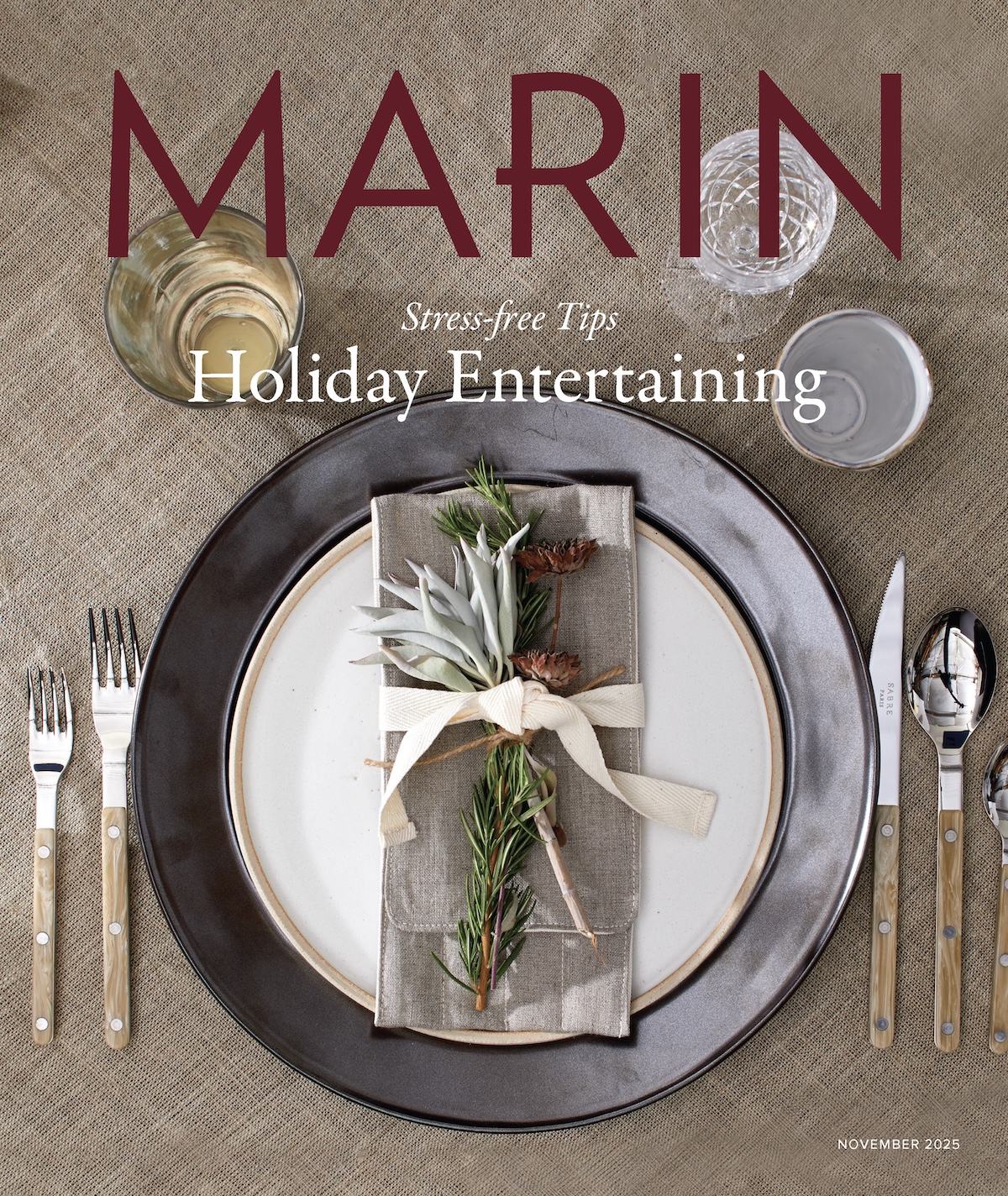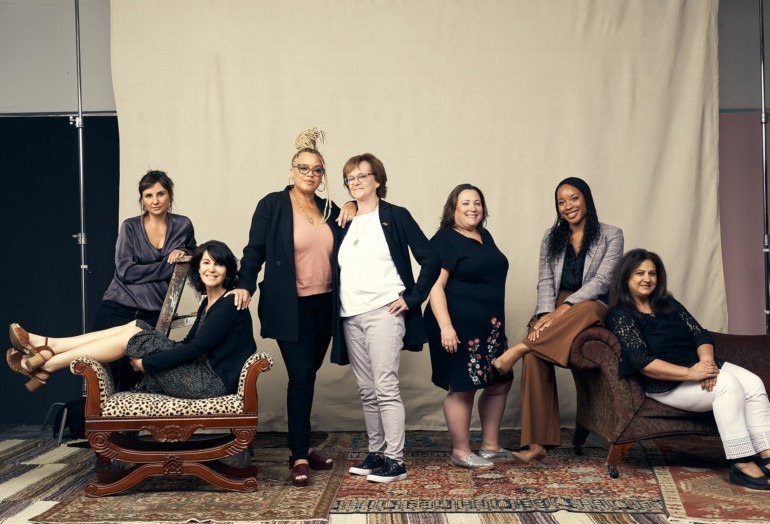Zoë Elton, Mill Valley Film Festival’s Director of Programming, is “moving aside” after more than 40 years, and taking on a new, more “curatorial” role. Elton sits down to discuss some of her favorite moments over the last four decades, how the pandemic did (and didn’t) change how we watch films, and what attendees can expect at this year’s MVFF.
When UK-born Zoë Elton moved to the United States in the 1970s, her intention was to move here for a year, hitchhike around, and then return to England. Having studied theater in London, Elton had no idea that an offer to join the-then newly created Mill Valley Film Festival (MVFF) would turn into a fascinating career that would span more than 40 years. During her tenure as the festival’s Director of Programming, Elton has helped to grow MVFF into an event that regularly draws 200 filmmakers, representing more than 50 countries.
And while Elton insists she is not “stepping down,” from her current role, but rather “moving aside,” she also admits that she is looking forward to reclaiming some of her time for her own creative pursuits. Ahead of Elton’s final film festival (MVFF48 will run October 2-12) as Director of Programming, we chat about ways the festival has changed over the last four decades, how she came to get involved in the Mind the Gap initiative, and what it was like to have Dame Judi Dench read her a Shakespearian sonnet over Zoom.

You got your start at MVFF after arriving from England over 40 years ago, when Mill Valley Film Festival was in its early inception. What was that like?
I had not long been in California from the UK, and someone said to me “these guys are starting up a film festival and you need a job,” and I did! So I got involved with the film festival in its very first year. Then the following year, Richard Jett said to me “Hey, let’s do video!” So he and I created what became the Videofest.
During that time I really had parallel careers – it was kind of interesting. I started working with a friend who is a jeweler and was looking for an assistant. So I started working for him a couple of days a week, and that was consistent throughout the year. I was also getting grants to write and direct my own theatre work, and then I was doing the film festival in the summer. So it was quite a smorgasbord of different things.
And over the last 40 years that you’ve been at MVFF, working as Director of Programming, how has it changed over that time?
When I first started in this role, we were a seven-day festival in one city and that was it. Now? We’re an 11-day festival in multiple cities [across Marin county], on multiple screens. The festival has really become a very important spot in the pantheon of festivals throughout the country – and in some way, throughout the world. It’s become the go to place for a lot of people who want to launch their films here – short films, documentaries, features and big films that are probably going to be on the awards track.
Booking has also changed – when we began, we would be getting somebody and Mill Valley would be the only place that they would be playing. Fast forward to now, and I’m talking with Focus, Netflix and Neon, about who’s going to come and when. And we’re having to navigate so many other festivals – they’re going to a new city and doing a Q&A every night.
Did the pandemic reshape or have a long-term effect on MVFF?
I would say yes and no. One of the benefits of the pandemic was that we discovered we could do things long distance. Festivals and art houses embraced, for a moment, streaming which is part of the long-term planning for the big studios. But that hasn’t negated the real, true importance for people to meet in a dark room, with a group of other people, and to see films from around the world. (I also got to interview Judi Dench via Zoom, and I got her to read me a Shakespearian sonnet – that wouldn’t have happened without the pandemic.)
There have been other things that I think that we’ve learnt, away from the public-eye, like trying to organize this very complicated festival, using spreadsheets that we can work on collaboratively, at the same time, while still being in different parts of the country. We can just be on a phone call together, working on the same project, and we would not have done that had it not been for the pandemic. But again, do people still need and love to be in communion with other human beings in a dark room? Yes they do. But is it to the extent that we were at, before the pandemic? Not quite, but we’re getting there.
Dame Judi Dench read you a Shakespearean sonnet? What was that like?
Oh my God, I thought I had died and gone to Shakespearian heaven! I mean it honestly just gives me chills to think about it. And she was so adorable. Friends of mine who had to move house during the pandemic, I was taking care of their dog, and while we were talking she said “oh my God is that a dog?” And she starts talking to the dog! It was a very special moment. There’s that odd intimacy that you can have – from my living room in Oakland going to Judi Dench’s living room in the London-area – that you don’t have on a stage, in real life.
And what are some of your favorite highlights and/or revelations working at the film festival?
One of the films that has become a lifetime favorite is Hyenas by Djibril Diop Mambéty, which we showed in the early 90s. It was just a revelation to me, and I think that was one of a couple of films that inspired me to go to Africa several times to research films and even attended the FESPACO festival in Ouagadougou, Burkina Faso.
Also showing Iranian-filmmaker Jafar Panahi’s early work The Mirror. I think there were things in that realm that instilled in me the love and fascination for Iranian cinema. I was lucky enough to go to Iran twice, as well to the film festival in Tehran. Then there was Jane Campion’s The Piano, Greta Gerwig’s Lady Bird, some of the video work that John Sanborn has done.
There’s also filmmaker and artist Lynn Hershman Leeson’s America’s Finest, which was installed at the Outdoor Art Club in Mill Valley as part of the Videofest. It taught me that men and women relate to guns in completely different ways.
I think one of the important things about the work [we do] is getting to understand why storytelling is so important and being able to bring that into our communities. Also being able to support the artists whose work we show and being open to other cultures through film.
What are you looking forward to the most in your new position?
Doing work in a more focused, curatorial way, rather than having a broad responsibility for the whole show. Also getting some time back to do my own creative work. I’ve been collaborating with a writing partner, who is a novelist in London, on a cozy mystery novel and that’s been great. I also do cartooning – these little characters called the Peace Sisters, which I also want to do more of, and I’m developing a graphic memoir based on one of my trips to Iran. I really just want time for my own creative, fun stuff.
The Mind the Gap initiative launched in 2015. How did you get involved with this program?
Throughout my tenure as a programmer at the festival, I’d always look out for women particularly, and people of all cultures and backgrounds, so that we would have a balanced program. In 2013 I put together a panel that was moderated by Stacy Smith of USC [Annenberg] and she had been doing a lot of work on the demographics and the numbers around gender equity. She had just brought out a report that was looking at the number of women directors in Hollywood, and it was around 7%. And I thought back to a women’s panel that I had done, I think in the 90s, and the percentage of women directors in Hollywood was around the same. So I thought, what can we actually do? And the Mind the Gap initiative was born out of that experience.
We were committed to getting to 50% women directors in the festival overall by 2020, which is pretty radical. And we’ve maintained a significant percentage, of around 50% across the whole festival, ever since.
On the note of diversity and equity, do you think the film industry is seeing the effects of recent moves towards rolling back diversity, equity and inclusivity efforts across the public and private sectors in America?
We are definitely already seeing the infiltration into the arts – many of our friends and colleagues have lost their NEA [National Endowment for the Arts] funding. I think the question will be how much of what we’re seeing now will turn into something bigger? Whether it will impact whose work actually gets funded, for instance, or how it gets funded. Whether there will be censorship. Yet artists and art prevails and finds a way to express itself, even when there is significant censorship and/or oppression. And indeed, should similar oppression happen here — or in any country — it’s worthwhile remembering that, and taking inspiration or example from artists who’ve navigated such challenges elsewhere.
Anything else that you’d like to share with Marin magazine’s readership?
Yes! We are showing Jafar Panaki’s film, It was Just an Accident, at MVFF48.
We also booked Hamnet, the new Chloé Zhao film with Jesse Buckley, as the opening night film, and are doing a spotlight on Jesse Buckley. It’s actually kind of wonderful. I’m stepping into this new role this year and I’m a Shakespeare nerd from way back. And they shot this film 15 miles from where I was born, in this village called Weobley in Herefordshire. To have this film for opening night feels like an odd sort of bringing together of a very personal circle.


